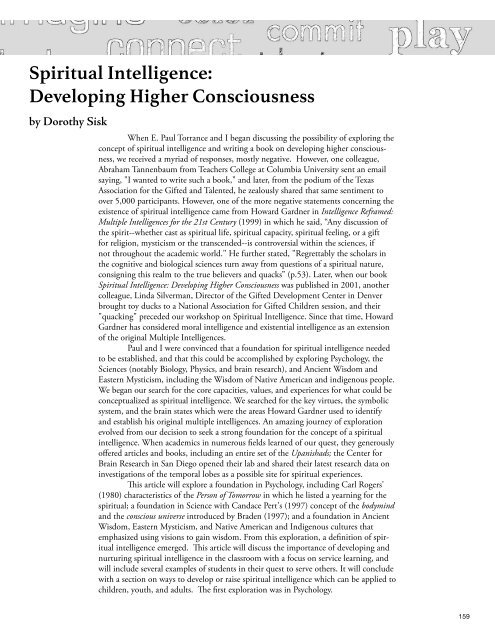Torrance Journal for Applied Creativity
TorranceJournal_V1
TorranceJournal_V1
You also want an ePaper? Increase the reach of your titles
YUMPU automatically turns print PDFs into web optimized ePapers that Google loves.
Spiritual Intelligence:<br />
Developing Higher Consciousness<br />
by Dorothy Sisk<br />
When E. Paul <strong>Torrance</strong> and I began discussing the possibility of exploring the<br />
concept of spiritual intelligence and writing a book on developing higher consciousness,<br />
we received a myriad of responses, mostly negative. However, one colleague,<br />
Abraham Tannenbaum from Teachers College at Columbia University sent an email<br />
saying, "I wanted to write such a book," and later, from the podium of the Texas<br />
Association <strong>for</strong> the Gifted and Talented, he zealously shared that same sentiment to<br />
over 5,000 participants. However, one of the more negative statements concerning the<br />
existence of spiritual intelligence came from Howard Gardner in Intelligence Reframed:<br />
Multiple Intelligences <strong>for</strong> the 21st Century (1999) in which he said, “Any discussion of<br />
the spirit--whether cast as spiritual life, spiritual capacity, spiritual feeling, or a gift<br />
<strong>for</strong> religion, mysticism or the transcended--is controversial within the sciences, if<br />
not throughout the academic world." He further stated, "Regrettably the scholars in<br />
the cognitive and biological sciences turn away from questions of a spiritual nature,<br />
consigning this realm to the true believers and quacks” (p.53). Later, when our book<br />
Spiritual Intelligence: Developing Higher Consciousness was published in 2001, another<br />
colleague, Linda Silverman, Director of the Gifted Development Center in Denver<br />
brought toy ducks to a National Association <strong>for</strong> Gifted Children session, and their<br />
"quacking" preceded our workshop on Spiritual Intelligence. Since that time, Howard<br />
Gardner has considered moral intelligence and existential intelligence as an extension<br />
of the original Multiple Intelligences.<br />
Paul and I were convinced that a foundation <strong>for</strong> spiritual intelligence needed<br />
to be established, and that this could be accomplished by exploring Psychology, the<br />
Sciences (notably Biology, Physics, and brain research), and Ancient Wisdom and<br />
Eastern Mysticism, including the Wisdom of Native American and indigenous people.<br />
We began our search <strong>for</strong> the core capacities, values, and experiences <strong>for</strong> what could be<br />
conceptualized as spiritual intelligence. We searched <strong>for</strong> the key virtues, the symbolic<br />
system, and the brain states which were the areas Howard Gardner used to identify<br />
and establish his original multiple intelligences. An amazing journey of exploration<br />
evolved from our decision to seek a strong foundation <strong>for</strong> the concept of a spiritual<br />
intelligence. When academics in numerous fields learned of our quest, they generously<br />
offered articles and books, including an entire set of the Upanishads; the Center <strong>for</strong><br />
Brain Research in San Diego opened their lab and shared their latest research data on<br />
investigations of the temporal lobes as a possible site <strong>for</strong> spiritual experiences.<br />
This article will explore a foundation in Psychology, including Carl Rogers'<br />
(1980) characteristics of the Person of Tomorrow in which he listed a yearning <strong>for</strong> the<br />
spiritual; a foundation in Science with Candace Pert's (1997) concept of the bodymind<br />
and the conscious universe introduced by Braden (1997); and a foundation in Ancient<br />
Wisdom, Eastern Mysticism, and Native American and Indigenous cultures that<br />
emphasized using visions to gain wisdom. From this exploration, a definition of spiritual<br />
intelligence emerged. This article will discuss the importance of developing and<br />
nurturing spiritual intelligence in the classroom with a focus on service learning, and<br />
will include several examples of students in their quest to serve others. It will conclude<br />
with a section on ways to develop or raise spiritual intelligence which can be applied to<br />
children, youth, and adults. The first exploration was in Psychology.<br />
159


